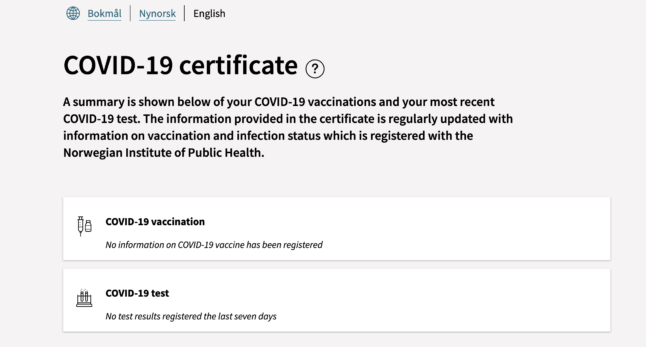Covid-19 certificates
The full version of Norway’s vaccine passport will launch in the second half of June.
The preliminary version is already available on helsenorge.no.

The full vaccine passport will show vaccination status, immunity to Covid-19 after contracting the virus, and test status.
Norway’s Covid certificate will be used to allow travellers to skip quarantine hotels, go on domestic tours and cruises, attend test concerts (more on that later), and potentially ease travel restrictions.
Norwegian PM Erna Solberg has previously said that vaccine passports would also help the country speed up its four-step reopening plan.
Test concerts
One for the live music lovers, the Norwegian government will begin running test concerts with capacity for crowds of 3,000 in June.
The government is trialing whether large events can go ahead with mass testing and vaccine passports in place.
Up to five events are planned to take place in Oslo and Bergen.
READ MORE: Norway to trial live concerts with mass Covid testing
Concert goers will be tested before and after the event so the Norwegian Institute of Public Health can determine the risk of infection at big events.
The NIPH has said it will be using participants aged between 18-45 who haven’t had coronavirus or received a vaccine.
Machetes banned
The sale and possession of machetes will be illegal in Norway from June, in an effort to crackdown on gang violence.
“This is a move in the fight against gang crime and violence and sends a clear signal to those who do not want to comply with law and justice,” Justice Minister Monica Mæland said.
The new law comes into place on June 1st and prohibits knives with a blade longer than 25 centimetres.
School holidays
Sommerferie, or Norway’s school holidays, will begin when school ends on June 18th.
The holidays will last for eight weeks until the middle of August.
The Norwegian government will be running a scheme whereby children are encouraged to read books throughout the summer.
Sommerles will aim to get 15,000 children on board this year. The campaign will see children collect prizes based on how many books they read this summer.
Vaccine deliveries pick up the pace
From the beginning of June, Norway will start receiving larger vaccine deliveries.
The larger shipments will allow the country to vaccinate greater numbers of people and speed up its vaccination program.
In recent weeks, the majority of inoculations have been given to people who have already received their first jab.
Norway has vaccinated more than a million people so far.
READ MORE: Can I travel to Norway if I’ve been vaccinated against Covid-19
The larger deliveries mean Norway will be able to offer more first does and vaccinate more of its population.
“Deliveries will pick up a lot from next week. Then vaccination will definitely pick up. We are in the last week with a fairly low supply and where most vaccines will be used as second doses,” Chief Physician Preben Aavitsland at the Norwegian Institute of Public Health told newspaper Aftenposten.
Norway will also begin redistributed vaccines to areas in eastern Norway that have had continuously high numbers of infections during the pandemic.
More restrictions could be lifted in Oslo
The Norwegian capital could move to step three of its five-step reopening plan.
Oslo’s Executive Mayor, Raymond Johansen, has said the city council would consider lifting more Coronavirus measures on June 10th
Read More: Oslo reopens bars, restaurants and gyms
It is not currently clear whether the city will move entirely to step three as it adopted a phased approach to stew-two with the two phases being introduced three weeks apart.



 Please whitelist us to continue reading.
Please whitelist us to continue reading.
Member comments